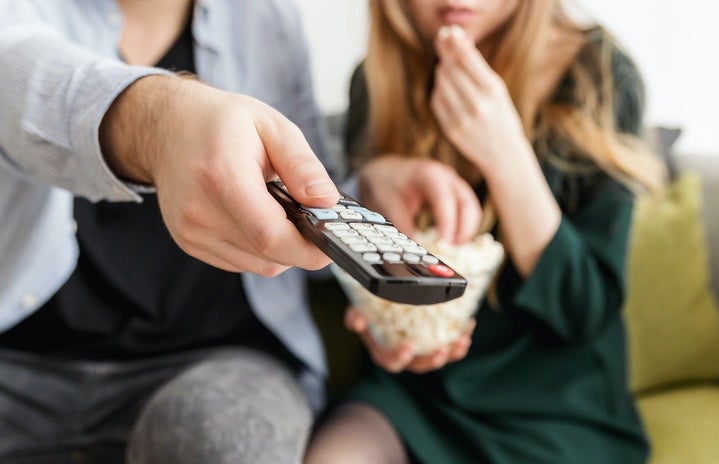TW/CW/Spoilers: The following article contains mentions of murder, violence, domestic abuse, rape, and sexual assault. The following article also contains spoilers for the show You.
The way you stalk and prey; it’s a cry for help. These vulnerable women, they can’t see you for you. They’re fooled by your mask. You’re a good guy, you are. Always there to help in times of need. No request is too much for you. Of course, that is until the chase gets boring. What’s wrong? Are you scared that, for the first time, someone sees right through your façade? Maybe these women can’t, but I sure can. I know exactly who you are, Joe Goldberg. You’re a murderer.
For many, October was characterized by the arrival of the third season of Netflix’s original series You. Fans of the psychological thriller have been long awaiting this moment after the show’s second season premiered in December 2019. Unlike the first two seasons, season three saw serial killer protagonist Joe Goldberg (Penn Badgley) finally settle down with his wife, Love Quinn (Victoria Pedretti), and their newborn son. But, like the first two seasons, Joe just can’t help but find new prospects to ‘adore.’ And, like the first two seasons, he walks away a free man.
As entertaining and captivating as always, You’s latest installment didn’t sit right with me. It could be the terrible timing. Season three aired just days after Gabby Petito, the woman whose disappearance and murder shocked the country, was pronounced dead by strangling. It could also just be the ending. Time and time again, Joe obsesses over some girl until he kills her. He starts a new life, maybe in Los Angeles or the fictional town of Madre Linde and faces absolutely zero repercussions for his actions. It’s not just predictable anymore, it’s exhausting to watch.
You and female characters: Joe Goldberg always wins
I am no hypocrite. I binge-watched all three seasons the second they hit Netflix. Still, I’m finding it more difficult to justify the show’s existence, especially when it plays out the true crime cases we seem to live through.
There were 56, 369 adult women who went missing in 2020 alone. On Oct. 21, a man finally confessed to murdering his wife, Gail Katz, who had gone missing 36 years ago. The world has enough depictions of female violence that, at this point, I don’t need nor want to be inside Joe’s mind anymore. And, it doesn’t help that You is simultaneously self-aware. In its third episode this season, library manager Marienne talks about the local woman who disappeared, explaining how it’s only being covered because she’s white.
“When white women receive a disproportionately high level of attention, a very clear message is being sent. White ladies deserve to be rescued. The rest of us can fend for ourselves,” the character said. This very sentiment, known as Missing White Woman Syndrome, was heavily discussed in the depths of the Gabby Petito case. According to The Los Angeles Times, “[Petito’s] story is likely to receive far more media coverage than any other missing-persons case this year, raising the same old skepticism of the implicit racism and classism driving traditional newsrooms’ determination of whose suffering is news and whose suffering isn’t interesting.”
Marienne continued, “Missing White Woman Syndrome is America’s favorite pastime next to porn”.
This specific conversation in You immediately reminded me of Gabby Petito. It demonstrates that the show takes place in a current time; a time where the Missing White Woman Syndrome does come into play. If nothing else, You producers could have been self-aware enough to postpone its release or to make a statement about Petito and the thousands of other women, especially women of color, who went missing before, during and after the show. Ultimately, in seasons one and two, it was intriguing to think about how Joe could get out of some of the many murders he committed. Now, all You has shown me is that women always lose to men on and off-screen.
A similar example that comes to mind is the comedic thriller “Promising Young Woman.” In the film, Cassie, played by Carey Mulligan, seeks revenge for her best friend’s sexual assault perpetrator. Eventually, this dark and ravaging path leads to Cassie’s death, one of the most heart-wrenching moments I’ve ever witnessed in a movie. The overarching theme is that there’s no way Cassie could have publicly exposed her friend’s assaulter without some consequence. Though I understand the film’s ‘realistic’ ending, it’s just another reminder that women are treated as inferior to men; a message that I don’t need a show or movie to reinforce.
Are you the protagonist, Joe Goldberg?
What’s arguably sicker and more twisted than You’s content itself is the fact that you’re inherently rooting for the killer. With every murder Joe commits, I find myself encapsulated, praying he’s able to walk away without a single scratch. Why is that?
“There are times where Joe is so impossibly sympathetic and even honest and brave,” Badgley told InStyle. “Sometimes he’s the exact perfect balance between chivalrous and allowing his partner to be autonomous and empowered.”
Some credit the ‘bad boy’ trope for our admiration of Joe. Though, to be fair, Joe is much more than a bad boy. He’s a murderer. Many think back to real-life examples where male serial killers gain female followings while they gain popularity for their crimes. The best example that comes to mind is Ted Bundy, the 1970s rapist who murdered at least 30 women, possibly even 100.
A Refinery29 article explains that during “each day of [Bundy’s] trial, women – referred to as “groupies” – would show up to the courtroom with their hair parted in the middle and wearing hoop earrings, on the assumption that this was the style worn by his victims. Some even dyed their hair brown to match the hair of those he murdered.”
Given the popularity that You’s Joe holds over his audiences, the Ted Bundy-like fanbase is potentially not one we left in the 70s. With a few minor searches on TikTok, I was able to find a hashtag titled “Joe Goldberg Edit,” encompassing plenty of thirst traps devoted to the man. The hashtag has amounted to 34.6 million views. Though Joe is a fictional character, his ‘groupies’ make me question if fans would be able to make distinctions between fiction and reality with future male serial killers.
Who’s watching You?
Call it cliché. I couldn’t help but use this subtitle to address a very serious inquiry: what demographics are watching this series? Though it’s difficult to accurately say what kind of people are watching this specific show, especially given its recent release date, Netflix itself has a large, young audience. In fact, a 2020 Morning Consult survey showed that 70 percent of Netflix’s subscribers are members of Generation Z. Further, the corporation expected 40 million households to tune into You’s second season. Currently, the show holds a top spot in Netflix’s national top ten list, which as a Forbes article explains, “is simultaneously a way for Netflix to plug its own originals even further…” The streaming service is undoubtedly promoting You. With popularity comes more of a responsibility.
This quote from Badgley might sum everything up: “Part of the strangeness of the concept for me is exactly why we’re all watching: Why are we making it? Why is it doing so well? These are interesting questions that have something to do with where we are all at, societally.”


